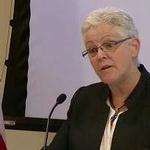 美新任環保署署長吉娜·麥卡錫( Gina McCarthy )7月30日於首次公開施政演說中表示,環境保護的重要性不亞於經濟表現,並承諾在歐巴馬政府任內,將對氣候變遷採取行動。麥卡錫說,「氣候變遷問題無法一夕解決,但我向各位保證,這必定會是未來三年的施政目標之一。」
美新任環保署署長吉娜·麥卡錫( Gina McCarthy )7月30日於首次公開施政演說中表示,環境保護的重要性不亞於經濟表現,並承諾在歐巴馬政府任內,將對氣候變遷採取行動。麥卡錫說,「氣候變遷問題無法一夕解決,但我向各位保證,這必定會是未來三年的施政目標之一。」
經過參議院激烈的審查討論,麥卡錫於7月19日被任命為環保署署長。面對「環境健康」與「經濟健康」如何選擇的質疑,她駁斥,反對者陷入了邏輯上非黑即白的謬誤。她指出,自1970年代早期通過具里程碑意義的環境法規以來,數十年的經濟成長有目共睹,她並舉出當時環保署執行的空氣清淨計畫和褐地(brownfield,指工業廢地)整治計畫佐證。
1970年到2011年間,全國內,即使國內生產總值(GDP)成長212%,人口成長了52%,但空氣污染排放量下降了68%。此外,1970年到1990年之間,空氣清淨法案計畫防止了205,000人過早死亡和18萬個兒童的呼吸系統疾病。私營企業方面,就業人數總計增加了88%。總體而言,她說,每投入一美元於「空氣清淨法」,就能獲得30美元的好處。
「我們能不能先停止談論環境法規影響工作機會,拜託?」麥卡錫說。 「長久以來,我們一直關注這種假設性的選擇。這不應該是孩子們的健康和經濟健康之間的選擇。」
麥卡錫還指出,褐地(都市中因受污染導致無法再開發利用的廢棄土地) 整治計畫就是政府反污染、造福經濟的另一種方式。麥卡錫說,自1995年以來,政府資助的褐地清理計畫挽回了41500英畝發展用地,創造93,000個就業機會,槓桿效率發揮出208億美元的經濟。環保署的褐地整治計畫花費的每一美元,可為公私部門造就17~18美元的整治和發展經費。
「這端看你如何使用聯邦資金,以促進公眾利益。而這正是環保署要做的事,環保局以實質性的正面影響全國人們日常的生活,我們正使用的方式,不但不會減緩經濟成長,反而在許多方面激發經濟成長。 」
這項人事任命,成功轉移了共和黨對歐巴馬政府以監管而非立法的方式執行氣候變遷政策的反對聲浪。在此策略下,美國環保局可以制定二氧化碳等汙染物的排放量,並在不需要得到國會的批准下,進一步展開行動。
在136天的確認期內,麥卡錫遭到共和黨參議員的強烈質疑,她被叫回參議院70次,回答超過1000個問題。眾議院共和黨人並已表達他們對環保署行動的不滿,並提案刪減環保署三分之一的預算。
「兩週前得知確認時,那真是一生的榮耀,」麥卡錫說。「而且,這是一件很好的事,因為我發誓這是花了兩輩子才得到的確認。」雖然焦點都在聯邦政府,但麥卡錫認為,頒佈法令的可能仍然很低。反之,各地州政府、非營利組織、大學、企業和個人過去的有效案例,才是聚焦的對象。
對於加拿大的基石XL油管(Keystone XL)此極具爭議的提案,麥卡錫形容她的角色是調解者,試圖讓各方解決他們之間的分歧。「這不容易,會很困難的。」她說。
麥卡錫以珊蒂颶風的破壞性影響為例,說明環境議題為什麼會處於經濟問題的核心。「我很肯定在珊蒂颶風之後,沒人把這場颶風看成是環境的挑戰,而是視為一場經濟災難。」麥卡錫說,「氣候變遷已不再是環境議題,而是徹徹底底的經濟挑戰,對我們而言,它是一個全球面對的根本性難題,而我們需要去正面迎戰。」
「今日的事實是,我們必須將減少碳污染作為激發企業創新的新手段。我們需要透過減少碳污染來增加工作機會。我們需要藉由減少碳污染來加強經濟。」麥卡錫說,「就去做!這就是我們處理這個難題的辦法。」
Newly confirmed Environmental Protection Agency Administrator Gina McCarthy on Tuesday pledged action on climate change during the Obama administration’s remaining years, saying the concern is as much economic as it is environmental.
“Climate change will not be resolved overnight, but it will be engaged over the next three years; that I can promise you,” McCarthy said during her speech at Harvard Law School.
McCarthy, confirmed to head the federal agency on July 19 after a bruising Senate review process, decried what she called a “false choice” between environmental health and economic health presented by those who oppose regulation. She pointed to the U.S. economy’s growth over the decades since landmark environmental regulations were passed in the early 1970s, and held up clean air and brownfield cleanup programs, both administered by the EPA, as examples.
Between 1970 and 2011, air pollution emissions fell 68 percent in this country, even as the gross domestic product rose 212 percent and the population increased 52 percent. In addition, Clean Air Act programs prevented 205,000 premature deaths and 18 million childhood respiratory illnesses between 1970 and 1990, she said. Total private-sector jobs increased 88 percent. Overall, she said, every dollar invested under the Clean Air Act has borne $30 in benefits.
“Can we stop talking about environmental regulations killing jobs, please?” McCarthy said. “For too long, we’ve been focused on this false choice. It’s not a choice between the health of our children and the health of the economy.”
McCarthy also held up the cleanup of brownfields – polluted urban lots that are often former factory or industrial sites – as another way that government anti-pollution action has benefited the economy. Since 1995, government-sponsored brownfield cleanups have returned 41,500 acres to development, generating 93,000 jobs and leveraging $20.8 billion in economic development, she said. Each dollar spent on the EPA’s brownfield cleanup program, McCarthy said, leads to between $17 and $18 in public and private funds for cleanup and development.
“This is how you use federal dollars to advance the public interest. That is what EPA is all about,” McCarthy said. “The EPA is having substantive positive impact on the lives of everyday people all across the United States, and we’re doing so in a way that not only doesn’t slow the economy, but in many ways that spark economic growth.”
McCarthy delivered her comments before 300 people gathered at Wasserstein Hall. Harvard Law School Dean Martha Minow introduced the talk, billed as McCarthy’s first public policy speech since she was confirmed. The session was hosted by the Law School’s Environmental Law Program.
The event had something of a homecoming feel, as McCarthy, who was raised in Boston, was introduced by her daughter, Maggie McCarey. The new EPA chief previously worked as an environmental administrator for several Massachusetts governors, including Mitt Romney, and also served as commissioner of the Connecticut Department of Environmental Protection before moving to the EPA as an assistant administrator in 2009.
McCarthy’s confirmation process became a lightning rod for Republican disapproval of the Obama administration’s decision to pursue climate-change action through regulatory rather than legislative means. Under that strategy, the EPA can regulate carbon dioxide as it does other pollutants and move ahead with some actions without approval from Congress.
McCarthy was subjected to intense questioning by Republican senators, and was called back to the Senate 70 times over a 136-day confirmation period during which she answered more than 1,000 questions. House Republicans have expressed their own disapproval of the agency’s activities, proposing cutting the EPA budget by a third.
“Getting confirmed two weeks ago, it was truly the honor of a lifetime,” McCarthy said. “And that, I think, is a very good thing because I swear it took two lifetimes to get confirmed.”
Though much of the spotlight has been on the federal government, McCarthy said that it rarely leads in promulgating regulations. Instead, she said, it embraces effective examples set by an array of state and local governments, nonprofits, universities, businesses, and individuals.
In response to a question on the controversial proposed Keystone XL tar sands oil pipeline from Canada, McCarthy described her role as that of a mediator who tries to get all sides to work out their differences.
“It’s not supposed to be easy; it’s supposed to be hard,” she said.
McCarthy cited the devastating impact of Superstorm Sandy as an example of how environmental issues are at their core economic ones.
“I’m quite sure following Hurricane Sandy, no one looked at that hurricane as an environmental challenge; they looked at it as an economic devastation,” McCarthy said. “Climate change isn’t an environmental issue. It’s a fundamental economic challenge for us. It’s a fundamental challenge internationally, and we need to embrace that challenge.”
McCarthy said the agency is committed to working in partnership with diverse groups to clean up the U.S. energy system in a way that not only lowers emissions from climate-changing greenhouse gases, but that also stimulates the economy.
“Today, the truth is that we need to embrace cutting carbon pollution as a way to spark business innovation. We need to cut carbon pollution to grow jobs. We need to cut carbon pollution to strengthen the economy,” McCarthy said. “Head-on. That’s how we need to deal with this issue.”
※ 全文及圖片詳見:ENS




